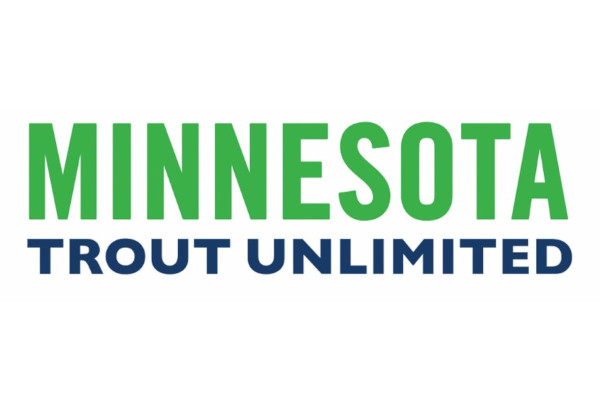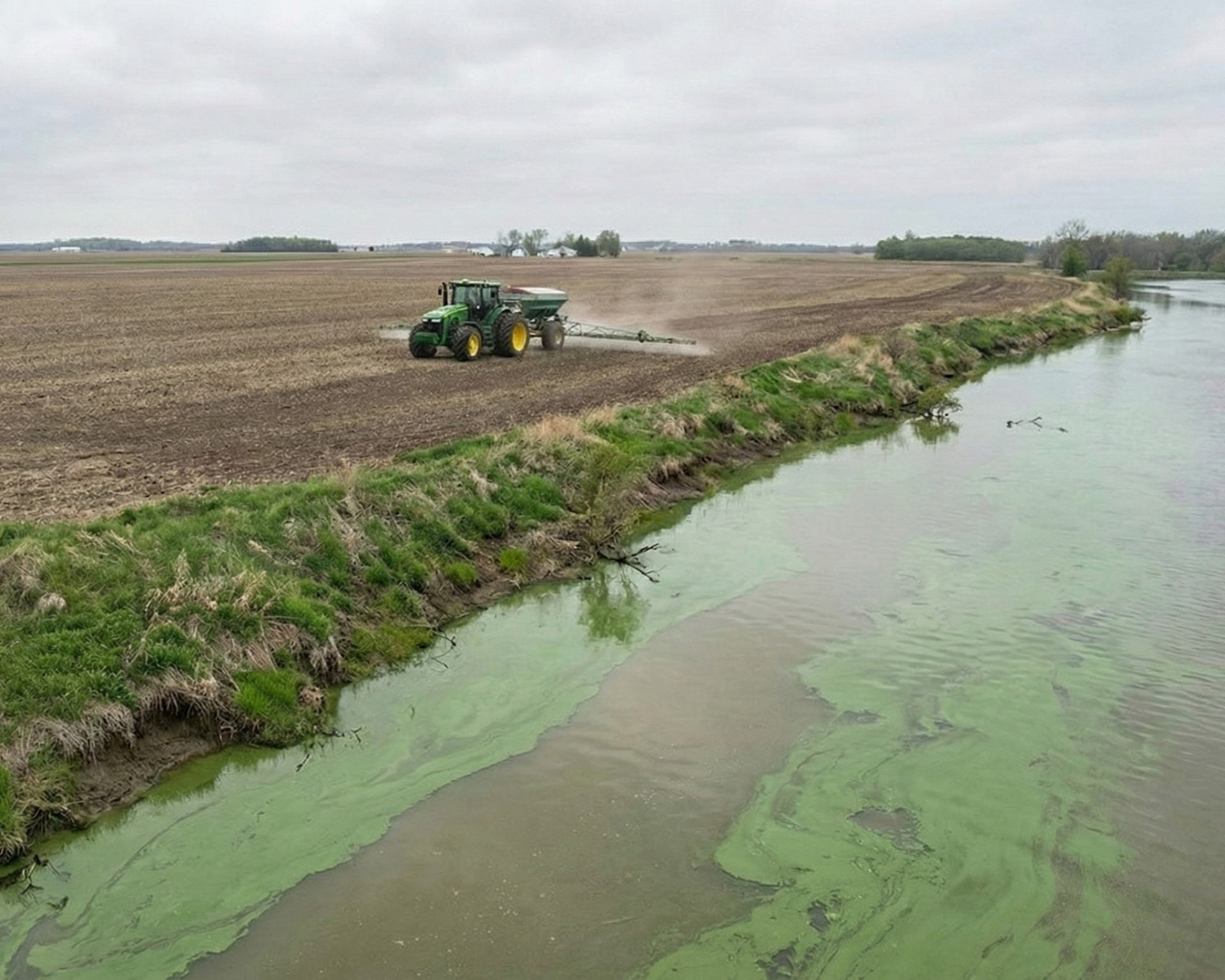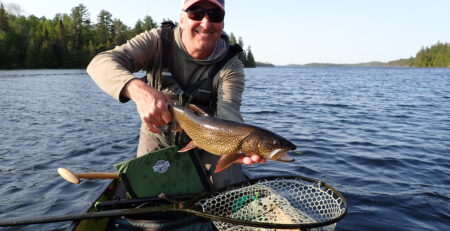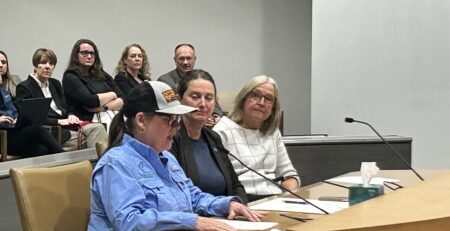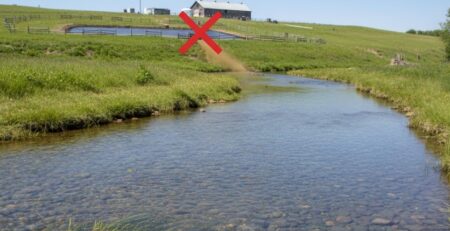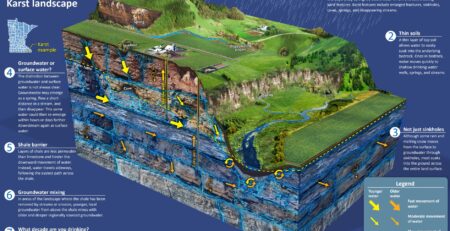Judge orders state agencies to assess whether manure and commercial fertilizer rules protect MN from nitrate pollution
DATE: 09/08/25 CONTACT: Sarah Horner, MCEA, shorner@mncenter.org, 612-868-3024
Saint Paul, Minn – A Ramsey County District Court judge ordered the Minnesota Pollution Control Agency (MPCA) and the Minnesota Department of Agriculture (MDA) to review whether the rules they have in place to protect Minnesotans’ drinking water from nitrate pollution are working. The order, filed Friday, reflects an agreement reached between the state agencies and the environmental groups who sued them earlier this year for failing to do enough to address Minnesota’s longstanding nitrate pollution problem.
The plaintiffs – the Minnesota Center for Environmental Advocacy (MCEA), the Minnesota Well Owners Organization (MNWOO), and Minnesota Trout Unlimited – celebrated the agreement as a necessary step toward ultimately securing better protections for Minnesotans and our shared natural resources from the known harms caused by runoff from excessive manure and commercial fertilizer application.
“Our goal in filing this lawsuit was always to initiate a public process that would allow all Minnesotans to come together to address a long-standing problem that affects people across the state,” said Joy Anderson, supervising attorney at MCEA. “We’re grateful to the agencies for their willingness to take a hard look at an issue they’ve recognized for decades as persistent and dangerous, and we are committed to working alongside them and all Minnesotans to create rules that work for everyone while protecting our drinking water.”
Under the agreement, MDA has a year to analyze its groundwater protection rule and conduct public inquiry into its effectiveness. MPCA’s process is already underway as it examines the adequacy of its existing rule governing feedlot operations, one of the major sources of nitrate pollution in the state. The agencies must issue findings at the end of their review periods on whether the state’s current rules are sufficiently protecting Minnesotan’s drinking water and natural resources from nitrate contamination. MCEA can challenge the agencies’ findings in court if they are not supported by the evidence.
The urgency of the legal order is underscored by a recently updated study by University of Minnesota associate professor Bonnie Keeler on the host of human health harms linked to consuming nitrate-contaminated drinking water, which include very pre-term births, spina bifida, cleft palates, various cancers, and Blue Baby Syndrome. The study estimates that nitrate-attributable health conditions in Minnesota cost $745 million annually when factoring in direct care costs and the impacts to quality of life. This estimate is only for people who get their water through municipal public water suppliers and does not include costs to private well users.
Nitrate pollution also contributes to toxic algal blooms harming fish and other aquatic life and rendering an increasing number of lakes, rivers and streams in Minnesota unswimmable and unfishable.
Commercial fertilizer and animal manure from animal feeding operations are unambiguously the biggest sources of nitrate pollution in the state. When nutrients are applied to fields in excess of crop needs, they wash away and seep quickly into groundwater in the state’s vulnerable karst and Central Sands regions, ultimately contaminating drinking water sources in the area with unsafe levels of nitrates. Minnesota’s administrative rules for feedlots and commercial fertilizer are the best tools we have to ensure that effective pollution-reducing practices are followed, especially in the most vulnerable areas of the state, but they are currently inadequate as evidenced by persistent groundwater pollution above federal limits.
The soils and geology of the southeastern karst and Central Sands regions make them particularly vulnerable to groundwater pollution.
Nearly 400,000 Minnesotans live in the karst region alone, and 94,000 of them rely on private wells, which are at higher risk for nitrate contamination due to lack of public oversight. The Environmental Protection Agency (EPA) found that at least 9,200 residents with private wells in southeastern Minnesota are at risk of drinking contaminated water above the federal health limit for nitrate.
This case was brought under the Minnesota Environmental Rights Act. As such, the plaintiffs are not seeking a monetary settlement. They brought the lawsuit to try to ensure stronger protections for Minnesotans and our natural resources from nitrate pollution. For a copy of the recent legal order, or to request an interview with MCEA staff, please contact Sarah Horner at the contact information listed at the top of this release.
Minnesota Center for Environmental Advocacy (MCEA) is a nonprofit, nonpartisan organization. Founded in 1974, MCEA uses the law and science to protect Minnesota’s environment, natural resources and the health of its people. www.mncenter.org
